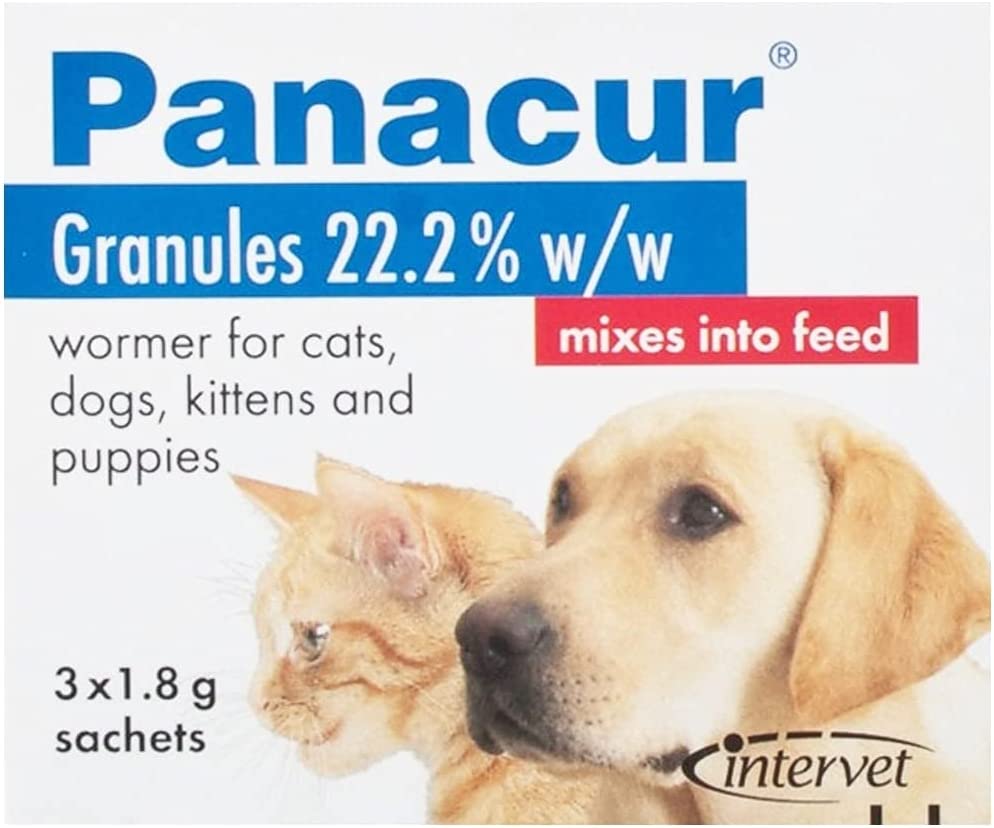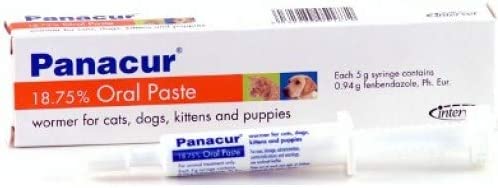Caring for pregnant dogs and unborn pups is a challenge with huge rewards. Their health must be examined so the mother and pups have the best start to their new life.
One of the obstacles with looking after a pregnant bitch is what medicine you should and shouldn’t be given. Pregnancy is a delicate period for dogs, and worms can harm their health and compromise the developing puppies.
Generally, pregnant bitches should be wormed frequently without fail. It’s recommended that your canine is wormed thrice: before mating, after the first 1.5 months of pregnancy and after giving birth. Subsequently, re-worm them (and pups) thrice: at 2, 5, and 8 weeks after weaning.
By understanding the necessary precautions and safe treatment options, we can help maintain the health and vitality of the mother and her future offspring.
Should you deworm a pregnant dog?
Before anything is said about worms during pregnancy, I should stress how important it is to regularly give your bitch worm treatment.
Worm infestation in pregnant dogs can harm the mother and her developing puppies if left untreated. The worms can deprive the pregnant dog of vital nutrients, leading to poor health and a weakened immune system. It also increases the risk of complications during pregnancy.
If you’re a breeder and the pregnancy is planned, then there is no excuse not to do this. This is the same principle as with their vaccinations. Don’t let your dog’s health be an afterthought.
When it comes to worm infestation in dogs, it’s essential to have a basic understanding of the general issue. Several worms commonly affect dogs, including roundworms, hookworms, whipworms, and tapeworms.
Roundworms are the most common, as they can be transmitted to puppies or through the mother’s milk before birth. Hookworms are another common parasite that can infect dogs through contaminated soil or mother’s milk during nursing.
Whipworms are acquired through ingesting contaminated food or water, while tapeworms are usually contracted by ingesting fleas or infected prey.
How to treat worms in a pregnant dog?
Addressing worm infestation in pregnant dogs requires a cautious approach to ensure the well-being of the mother and her developing puppies.
Note: It’s crucial to consult a veterinarian who can provide expert guidance and tailor the treatment plan to your dog’s needs.
The timing and frequency of worming during pregnancy will depend on various factors, including the stage of pregnancy, the type of worms involved, and your veterinarian’s recommendations.

1. What is the safest time to deworm pregnant dogs?
Generally, the safest time to deworm pregnant dogs is after the first 45 days (1.5 months) of pregnancy. Subsequently, they should be dewormed right after giving birth. However, it’s best to consult your veterinarian to determine the best time after considering your dog’s specific needs.
2. How much dewormer can I give my pregnant dog?
As a general guideline, the dewormer dosage for a pregnant dog depends on the dog’s weight and the specific deworming medication being used. It’s important to follow the instructions provided by the manufacturer or consult with a veterinarian for the appropriate dosage.
According to Panacur, “Administer 25mg of fenbendazole per 2.2 pounds (1kg) of body weight from day 40 of the dog’s pregnancy until two days after whelping, which is approximately 25 days.”
Best OTC Dog Dewormers Safe During Pregnancy
When it comes to treating worm infestation in pregnant dogs, it’s crucial to rely on the guidance and expertise of a veterinarian. They will prescribe safe and effective medications tailored to your dog’s needs.
Due to their safety and effectiveness, Panacur’s tablets or paste are considered the best deworming medicine for pregnant dogs. Panacur contains Fenbendazole, a widely trusted and proven ingredient for treating various dog worms. The reliable track record and the safe usage tag make it the top choice.
1. Panacur Granules Wormer

Panacur Granules Wormer is an excellent choice for safely deworming pregnant dogs. With its convenient application, you can simply sprinkle the granules on your dog’s food.
Each 1.8g sachet is designed for every 4kg body weight, ensuring an accurate dosage. The key ingredient, Fenbendazole, is effective against various worms and is suitable for cats and dogs, including unweaned puppies as young as two weeks old.
While the packaging might differ from what is shown in the photo, the sachets are individually labelled with dosage information, making them easy to tear and mix into your dog’s feed.
With its proven efficacy and ease of use, Panacur Granules Wormer is a reliable option for safely treating worm infestations in pregnant dogs.
Buy Panacur Granules Wormer for Dogs on Amazon
2. Panacur Wormer Paste

Panacur Wormer Paste is a versatile and convenient option for deworming dogs and puppies. This effective paste can also help control lungworms providing comprehensive protection.
Its user-friendly 5g syringes make administering the correct dosage a breeze. Each syringe is designed for dosing a 9kg animal in a single dose, ensuring proper treatment for your pet.
The recommended frequency is to use Panacur 2-4 times per year for optimal prevention and control of worms. The paste formulation offers an easier alternative to traditional tablets, making it more convenient for pet owners and furry companions.
With Panacur Wormer Paste, you can confidently address worm infestations and safeguard the health of your beloved pets.
Buy Panacur Wormer Paste for Dogs on Amazon
Read More: What is the best worm treatment for dogs?
What are the side effects of worms in pregnancy?
While deworming medications are generally safe and well-tolerated, it’s important to be aware of potential risks and side effects.
- Gastrointestinal Upset: Some dogs may experience mild digestive upset such as vomiting, diarrhoea, or loss of appetite after taking a deworming medication. These symptoms are usually temporary and resolve on their own.
- Allergic Reactions: In rare cases, dogs may have an allergic reaction to certain deworming medications. Signs of an allergic reaction may include itching, swelling of the face, lips, or tongue, difficulty breathing, or hives.
- Neurological Effects: Certain deworming medications, particularly those containing organophosphates, may cause neurological side effects in dogs. These can include tremors, seizures, weakness, or changes in behaviour.
- Reproductive Risks: It’s essential to use dewormers that are labelled safe for use during pregnancy and follow your veterinarian’s recommendations.
It’s important to note that side effects vary among individual dogs; not all dogs will experience these effects. Always consult with your veterinarian before administering any medications to a pregnant dog.
What is the best natural dewormer for dogs?
While deworming medications are the most common method of treating worm infestations in pregnant dogs, some pet owners may prefer alternative approaches.
Diatomaceous Earth is the best natural dewormer for dogs. It’s effective against various worms due to its abrasive texture – which physically disrupts and dehydrates parasites. Additionally, diatomaceous earth is generally safe for dogs when used appropriately.
Here are some more you can consider:
- Herbal Supplements: Certain herbs and natural supplements have been suggested to have antiparasitic properties and may help manage worm infestations. Examples include garlic, pumpkin seeds, and diatomaceous earth.
- Probiotics: While they don’t directly eliminate worms, they can contribute to overall gut health, which may help prevent and manage worm infestations.
- Hygiene and Cleanliness: Regularly disinfect your dog’s bedding, living area, and surrounding environment. Properly disposing of faeces and practising good hygiene can also prevent the spread of worm eggs.
Disclaimer: Natural remedies may be less effective and have potential risks or interactions with other medications. Always consult your veterinarian before doing anything.
Read More: Deworming Your Dog Using Home Remedies in the UK
Frequently Asked Questions (FAQs)
1. Can I use over-the-counter dog dewormers on a pregnant dog?
You can use over-the-counter dewormers on a pregnant, but it’s important to consult a veterinarian before using any OTC dewormers. Some medications may be unsafe during pregnancy, and professional guidance is recommended.
2. How often should a pregnant dog be dewormed?
The timing and frequency of deworming during pregnancy may vary depending on the specific situation and the veterinarian’s recommendations. It is best to consult a professional to determine the appropriate deworming schedule.
3. Should I consult a veterinarian during my dog’s pregnancy?
It is highly recommended to consult a veterinarian during your dog’s pregnancy. They can provide guidance, perform necessary tests, and monitor the health of the pregnant dog to ensure a safe and successful pregnancy.
4. What precautions should I take when worming a pregnant dog?
When worming a pregnant dog, there are a few precautions to remember.
- Consult your veterinarian to ensure you use a safe and appropriate deworming medication.
- Follow the recommended dosage and administration instructions carefully.
- Monitor your dog for adverse reactions and contact your vet if you notice any concerning symptoms.
5. Will ivermectin hurt a pregnant dog?
Ivermectin is an antiparasitic that’s generally considered safe for dogs. However, you must exercise caution for pregnant dogs, as certain breeds may be more sensitive to the drug. It is best to consult a veterinarian for safe deworming options during pregnancy.




